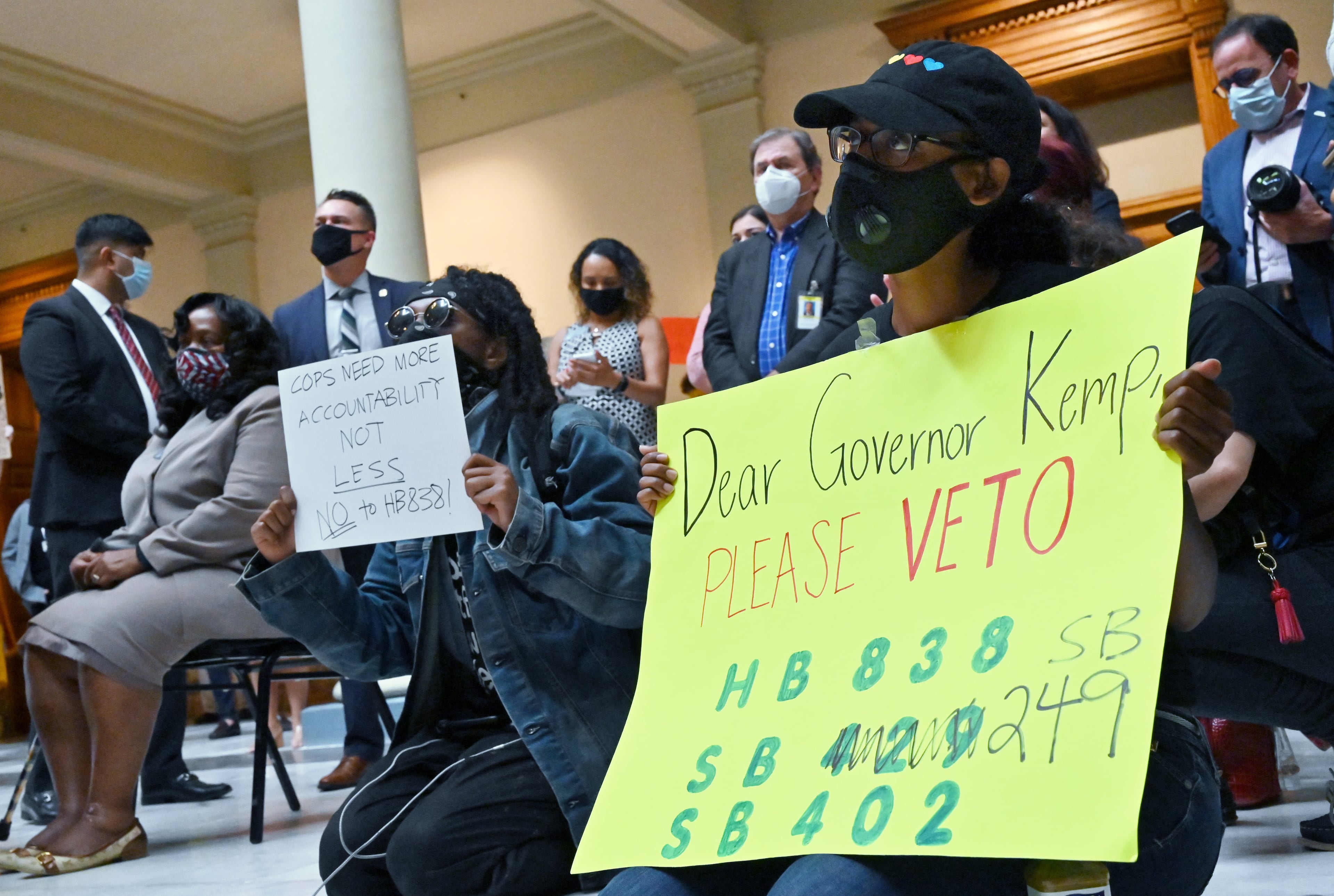Georgia governor signs hate-crimes measure into law

Gov. Brian Kemp signed a hate-crimes measure into law on Friday after state lawmakers brokered a compromise over the proposal after 16 years of debate over whether to extend protections to people who are targeted because of biases.
The Republican signed the measure at the state Capitol surrounded by bipartisan supporters of the proposal, saying it was a crucial step toward righting a historical wrong.
“It’s a sign of progress and it’s a milestone worth applauding,” said Kemp, adding: “Frankly, it’s the silver lining in these difficult times and stormy days.”
PHOTOS: Gov. Kemp signs hate-crimes bill on last day of legislative session
LIVE: Track major Georgia bills and see odds of passing
The proposal, House Bill 426, would allow enhanced criminal penalties to be levied against those who target their victims on the basis of race, gender, sexual orientation, sex, national origin, religion, or physical or mental disability.
It had been bottled up in a Senate committee with no prospects of passing until graphic video emerged of the death of Ahmaud Arbery, a Black man from Glynn County whose shooting death prompted new demands for the legislation.
Senate leaders abandoned efforts to treat police officers as a protected class, clearing the way for a bipartisan 47-6 vote to pass the measure. The House, which had last year approved a similar measure, voted 127-38 for the final version.
The legislation was the most tangible sign that demonstrations demanding racial equality and an end to police brutality had influenced policymakers in Georgia.
A string of conservative lawmakers, many who had long opposed the effort, gave emotional testimonies about how Arbery's death and led to a reckoning and spurred a change of heart.
A group of 44 lawmakers voted “no,” with some citing long-held criticisms that it could be applied unevenly by judges and used to restrict free speech rights. Others declined to comment.

'Catastrophe' averted?
It passed after an extraordinary lobbying campaign by pro-business groups, civil rights advocates and House Speaker David Ralston, who spent nearly two months pushing the Senate to adopt the legislation.
State Rep. Calvin Smyre, who helped fashion the compromise with Republican state Rep. Chuck Efstration, had warned it would be a “catastrophe” if Georgia ended the legislative session as one of only four states without a hate-crimes statute.
He was in the Legislature in 2000 when an earlier version was adopted, and participated in fruitless efforts to revive the law since it was struck down by the Georgia Supreme Court in 2004 as “unconstitutionally vague.”
“Ahmaud Arbery’s death will not be in vain,” said Smyre. “This is a defining moment in the history of our great state.”
To win over Republican support, Lt. Gov. Geoff Duncan and Senate leaders pushed a separate measure meant as a show of confidence for law enforcement officials.
House Bill 838 imposes additional criminal penalties on people found guilty of committing a crime against a police officer or another first-responder because of their occupation. Kemp has not said whether he'll sign it, though he's expected to do so.
It narrowly passed amid staunch opposition from Democrats and civil rights groups, who pointed to existing laws that give police legal protections. A small group of protesters held signs at the ceremony Friday urging Kemp to veto the measure.
And the Georgia NAACP on Friday released a statement that said the compromise worsens a “toxic divide” and announced that Arbery's mother, Wanda Cooper-Jones, would not attend the ceremony.
“To see the Legislature prioritize HB 838 instead of repealing citizens arrest is heartbreaking and does not do justice for son,” said Cooper-Jones, referring to a priority of the Georgia NAACP and other advocacy groups.
Shortly before the bill signing, Ralston expressed his sympathies to Arbery's mother, adding that “nothing we can say will alleviate” her suffering.
“But we can send a message that Georgia is better than what we saw on that awful, sickening, disgusting video,” he said. “We in Georgia are better than that.”


